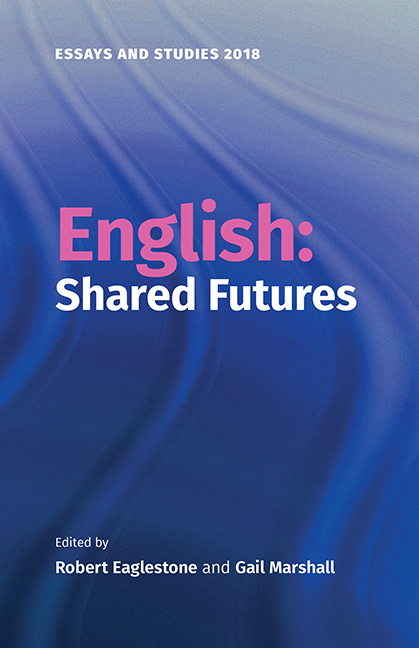Book contents
- Frontmatter
- Contents
- Notes on Contributors
- Acknowledgements
- Abbreviations
- Introduction
- The Changing Picture of School English
- From A-Level to HE: Working Towards a Shared Future?
- English Outreach: Academics in the Classroom
- From Provider to Stager: The Future of Teaching English in HE
- Pedagogic Criticism: An Introduction
- Exquisite Tensions – Narrating the BAME ECA Experience
- Postgraduate Futures: Voices and Views
- Shared Futures: Early Career Academics in English Studies
- Some Reflections on the Funding of English Departments
- English: The Future of Publishing
- Digital Futures
- A View from the United States: The Crisis in the Humanities; the Liberal Arts; and English in the Military Academy
- The Future of Borders
- ‘Between and Across Languages’: Writing in Scotland and Wales
- Exploring Intersections between Creative and Critical Writing: An Interview with Elleke Boehmer
- Integrating English
- Employability in English Studies
- Creative Living: How Creative Writing Courses Help to Prepare for Life-long Careers
- Practice at Large: How Creative Writing can Enhance University Research Environments
- ‘And who can turn away?’ Witnessing a Shared Dystopia
- English and the Public Good
- ‘Can Wisdom be put in a silver rod? / Or Love in a golden bowl?’ On Not Defending the Humanities
- ‘Something Real to Carry Home When Day Is Done’: The Reader in Future
- Afterword
- Index
Employability in English Studies
Published online by Cambridge University Press: 15 October 2019
- Frontmatter
- Contents
- Notes on Contributors
- Acknowledgements
- Abbreviations
- Introduction
- The Changing Picture of School English
- From A-Level to HE: Working Towards a Shared Future?
- English Outreach: Academics in the Classroom
- From Provider to Stager: The Future of Teaching English in HE
- Pedagogic Criticism: An Introduction
- Exquisite Tensions – Narrating the BAME ECA Experience
- Postgraduate Futures: Voices and Views
- Shared Futures: Early Career Academics in English Studies
- Some Reflections on the Funding of English Departments
- English: The Future of Publishing
- Digital Futures
- A View from the United States: The Crisis in the Humanities; the Liberal Arts; and English in the Military Academy
- The Future of Borders
- ‘Between and Across Languages’: Writing in Scotland and Wales
- Exploring Intersections between Creative and Critical Writing: An Interview with Elleke Boehmer
- Integrating English
- Employability in English Studies
- Creative Living: How Creative Writing Courses Help to Prepare for Life-long Careers
- Practice at Large: How Creative Writing can Enhance University Research Environments
- ‘And who can turn away?’ Witnessing a Shared Dystopia
- English and the Public Good
- ‘Can Wisdom be put in a silver rod? / Or Love in a golden bowl?’ On Not Defending the Humanities
- ‘Something Real to Carry Home When Day Is Done’: The Reader in Future
- Afterword
- Index
Summary
In a UK Higher Education landscape increasingly shaped by tuition fees and high levels of student debt, Destinations of Leavers from Higher Education (DHLE) survey data, the NSS, and the TEF, the need to focus on the employability of humanities graduates has never been greater. Prospective humanities students run the risk of being deterred from studying subjects that are not vocational, or might even forgo higher education for apprenticeship schemes. On the other hand, in seeking to present undergraduate degrees in English Literature, English Language, and Creative Writing as routes to specific forms of employment, we might risk undermining or damaging the qualities and values that mark English Studies degrees out as distinctive and appealing to both prospective and current students. In The Singularity of Literature, Derek Attridge defines ‘ instrumentalism’ as ‘the treating of a text (or other cultural artefact) as a means to a predetermined end: coming to the object with the hope or the assumption that it can be instrumental in furthering an existing project’. Attridge goes on to present his book as ‘an attempt to conceive of literature (and by implication other artistic products and practices) […] as, in fact, defined by its resistance to such thinking’. This essay seeks to identify and examine some of the employability strategies currently being implemented within undergraduate degree courses in English in the UK – focusing on the examples of two institutions in the North East of England – and to ask how and whether ensuring a sustainable shared future for our disciplines by continuing to attract students, while also enhancing students’ prospects when they graduate, can be reconciled with resistance to the idea of literature (and, by extension, of a literary studies degree) as a means to a predetermined end.
In order to explore these issues, let us turn first to Teesside University, which was cited in 2015 among a number of institutions engaging in ‘pioneering work’ in the integration of employability within the English syllabus. In 2013, the revalidation of Teesside's BA (Hons) English Studies and BA (Hons) English Studies with Creative Writing programmes was seized as an opportunity to build on the strengths of the existing undergraduate provision by extending the embedding of employability in the curriculum.
- Type
- Chapter
- Information
- English: Shared Futures , pp. 152 - 161Publisher: Boydell & BrewerPrint publication year: 2018

